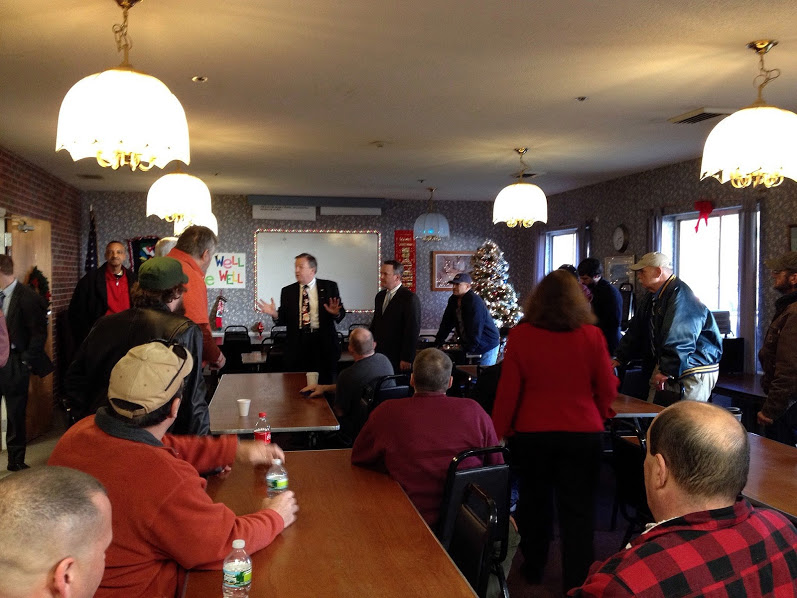Fewer Massachusetts veterans homeless, Lt. Governor Murray says
The images are equally disturbing — that of a soldier fighting, risking his or her life for the country, and seeing that same soldier among the living, but living on the streets.
On Wednesday, during the annual Veterans’ Service Officers Luncheon at the Statehouse, Lt. Gov. Timothy Murray said new federal data shows veteran homelessness has dropped 26 percent in Massachusetts between January 2010 and January 2012. That statistic exceeds the 17 percent national rate of decline over the same two-year period.
Local veterans services agents say the decline is also reflected in Berkshire County, but the risk of homelessness for vets persists. While programs to help veterans are working now, officials say the military’s troop drawdown could eventually overwhelm the system.
“The numbers the lieutenant governor is talking about are relatively true: There has been a decrease in the number of vets on the street,” said John “Jack” Downing, the president and CEO of Soldier On. The organization provides three veterans housing sites — two in Pittsfield and one at the Veterans Affairs Medical Center in Leeds.
Downing said about 90 percent of veterans in Soldier On housing are individuals versus veterans with families.
The data cited by Murray, who chairs both the Governor’s Advisory Council on Veterans’ Services and the Interagency Council on Housing and Homelessness, is based on a count of homeless veterans by the Veterans Affairs and Housing and Urban Development departments. The count was conducted on a single night in January 2012, and compared with previous single-night annual counts. The 1,181 people counted in 2012 represented a 7 percent decline from 2011 and a 26 percent decline from 2010.
The decline is attributed to new programming, increased collaboration among networks of providers, and availability of comprehensive veterans’ benefits.
Both Downing and Pittsfield Veterans’ Services Officer and Director Rosanne Frieri specifically credited a four-year-old federal program known as HUD-VASH — the Department of Housing and Urban Development’s Veterans Affairs Supportive Housing program. The program provides rental assistance, case management and clinical services.
“With VASH, veterans are getting into apartments a lot easier with less money,” said Frieri.
The program has also led to more employment for veterans.
“We’ve been able to see guys who have been chronically homeless become established,” said Downing.
Citing the current government drawdown of tens of thousands of troops, Downing cited a “hardcore reality.”
“[Those soldiers are going to be] returning to us, on top of the normal attrition of military personnel finishing their tours,” he said. “Most of us doing the work with veterans have realized those numbers could start to rise again, and we’re not ready with all the programs and services needed to assist them.”
Frieri said the Pittsfield veterans affairs office has “never been busier,” with more than 130 people claiming a portion of the city’s $85,000 veterans benefits monthly payroll.
Downing said that the Western Massachusetts region may be less affected by the military drawdown because there have been fewer reservists called to service from the region versus other parts of the country.
“We’re still not good at preventing people from going homeless but we’re better at it, and hopefully we won’t have that kind of spike,” Downing said.
The local agents lauded the state government for its attention to veterans issues, as well as local collaborations on the matter.
Murray said he intends to release a statewide plan later this winter to further address homelessness among the veteran population.
Last January, the department launched a pilot program in collaboration with VA known as the Statewide Housing Advocacy for Reintegration and Prevention (SHARP) program. It aims to accelerate the housing process and offers veteran-to-veteran peer support, mental health services, psychiatric evaluation and linkages to emergency shelter to chronically homeless veterans.
Back in October, the state government announced that it had received new federal funding to expand peer-supported “housing first” opportunities in the state. This new funding will hire nine new peer support specialists, 12 new case managers, and is accompanied by 320 new HUD-VASH vouchers.
Downing said Soldier On has also applied for local grants through the federal Supportive Services for Veteran Families program, which will be announced in July.
To view the entire article, visit http://www.berkshireeagle.com/ci_22344253.



